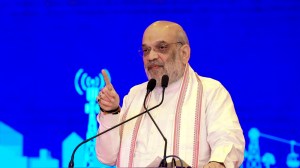Not just Sylvia Plath
In an age that draws its literary choices from Oprah Winfrey's show, Ted Hughes was one of a kind. Poet Laureate of Britain since 1984, h...

In an age that draws its literary choices from Oprah Winfrey’s show, Ted Hughes was one of a kind. Poet Laureate of Britain since 1984, he was more than just one of the finest voices in the English language. He was also more than just the man who restored to a genre a vitality that was missing from a weary post-war Britain. Hughes, not the least because of his first wife who famously committed suicide, was a tragic figure of Heathcliff proportions, the kind you and I grew up reading thanks to Hardy and the Bronte sisters. A man who until January this year spent 35 long years suffering silently the angry accusations of assorted feminists about how he drove the talented Sylvia Plath to suicide, her Princess Diana to his Prince Charles. His silence about Sylvia Plath made him, “a projection post for every worst suspicion”.
For Hughes, poetry was a way of making things happen the way you want them to happen. Perhaps because until he published Birthday Letters in January, a book of poems he wrote to hislate wife, everything did not happen the way Hughes would have wanted. For women the world over, he became the cad who left an unstable woman along with two children and ran off with a married woman, Assia Wevill.
While Plath’s myth of a troubled genius grew in death, Hughes was demonised as the archetypal man who suppressed talent, a T.S. Eliot to her Vivian Haight Wood. Plath was immortalised and held up by a succession of feminists as the thwarted underachiever, the woman wronged, endorsing a victimhood that Andrea Dworkin and Catherine MacKinnon extended to absurd legalistic and literal lengths. Their relationship was echoed in every doomed coupling – Marilyn Monroe and John F. Kennedy and Jacqueline Du Pre and Daniel Barenboim.
Her legend grew as did her iconic status, so much so that the battle over the rights to film her life continues still and there is much angst that the ditzy blonde Meg Ryan will be playing her, instead of a more soulful, Meryl Streep type. But I have always felt that bycanonising Plath women have done themselves a certain amount of disservice. Suicide is the easy way out. Carrying on, even with the amazing talent that produced Ariel, is the more difficult task. One that Hughes did admirably.
Once Plath put her head in an oven in her London flat after a bad winter in 1962-1963, Hughes moved back and forth through the 1960s from Ireland to Devon with his two children. His trauma continued when Wevill and her daughter Shura died in 1969 — so did his mother. It ended only when he married Carol Orchard a year later — how fickle, said his critics — but it was not until his Birthday Letters that he published a great work again. Perhaps it is we as an audience who want to read about pain even as we struggle against it in our daily existence, want it to be elevated to an artistic experience, a collective enterprise. His life, on a reclusive Devon farm, was hardy, but also more suited to his elemental self.
For many of us as students Plath and Hughes were theideal couple — meeting at a literary Cambridge party in 1956, she American and he from Mytholmroyd in the Yorkshire Pennines. To many she was the woman who made him a success, who was able to get him to publish the epoc-making The Hawk in the Rain. Plath, though not the basket case that many would like us to believe, was always gifted but troubled. Despite their remarkable talents, they were unable to convert their marriage into a relationship. It became a metaphor for what strong men could do to their women rather than what it should have been: what weak women could do to themselves. With Hughes gone too, let the was-she-victimised debate rest and let the world get on with facing up to problems, not running away from them. The farm-roots sink in the welter again, like a whale’s fluke/Sheep fade humbly/The owl cries eerily, breaking parole/With icicles darkening witness. And Ted Hughes takes his leave.
Photos





- 01
- 02
- 03
- 04
- 05


























